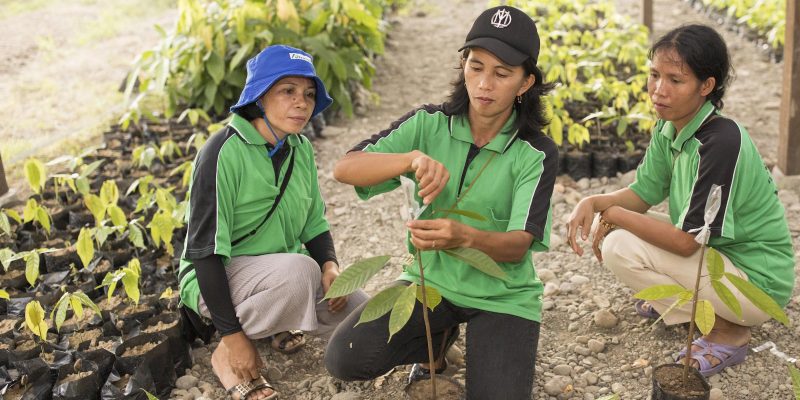
In May 2016, MCC approved a reallocation from the Green Prosperity Facility Activity to the PLUP Activity, the Procurement Modernization Project, and the Nutrition Project. The ERRs associated with the affected projects or activities had not been calculated (in the case of the PLUP Activity and the Procurement Modernization Project) or were not significantly impacted by the proposed modification (in the case of the Nutrition Project). This reallocation was prompted by several developments in the compact:
- As a result of the increase in geographic scope of the GP Project to align with GP grantees, the PLUP Activity expanded to cover a total of 45 districts, up from the 26 districts originally envisioned, which required an additional $16.6 million. An additional $1.5 million was requested for mapping peatland hydrology in four priority districts in partnership with the new Peatland Restoration Agency (BRG) established by the GOI in 2016. MCA-Indonesia entered into a partnership with BRG in 2016 to deepen the GP Facility’s engagement with peatland restoration work as part of its existing portfolio and to connect those projects with the GOI’s leading technical experts.
- As the Procurement Modernization Project entered Phase II, the focus shifted to ensuring replicability and sustainability of the activities. There was a desire by both LKPP and MCC to ensure that Phase II PSUs were strategic and aligned with Indonesian President Widodo’s desire to improve spending for high priority social and physical infrastructure. As a result of this orientation, MCA-Indonesia requested $1.5 million to develop and mentor participants in specialized training modules for the Ministries of Public Works, Transportation, and Finance under the Procurement Professionalization Activity. Due to their large procurement spending (over $10 billion in 2016), these three ministries provided the Procurement Modernization Project with an opportunity to improve the procurement of infrastructure that underpins the GOI’s national economic development objectives. An additional $4 million was provided to support increased training and logistical costs for Phase II PSUs.
- Approximately $6.2 million in additional funds were used to expand the reach of the PSU mentoring, framework contracting, and procurement management information system (PMIS) sub-activities. Following the successful integration of fraud filters into the PMIS, LKPP requested an additional $1 million to expand the roll out of fraud filters nationwide. Under the Policy and Procedure Development Activity, an additional six pilot model bidding documents were developed for PPPs. The reallocation provided $1.5 million to establish a knowledge and communications center in LKPP to sustain and scale up procurement modernization in Indonesia beyond the compact term. These changes aimed to deepen the Procurement Modernization Project’s engagement with critical GOI entities to expend more of their budget, with greater efficiency, and deliver key public services of greater quality.
- For the Nutrition Project, an additional $4.7 million was provided to the National Nutrition Communications Campaign in two main areas: 1) a mass media campaign to reinforce and popularize key nutrition and sanitation messages; and 2) a direct interpersonal communications campaign. MCA-Indonesia expanded the mass media effort to include additional TV, radio, and print advertisements and an intensification of the digital media campaign. MCA-Indonesia also funded a program of direct communications at the district and village level, consisting of interpersonal communication skills training, advocacy, and community-based activities and events. These activities were implemented by leveraging community groups, implementing partners, and existing agencies in three selected districts, while the mass media component of the campaign continued at the national level.
In June 2016, MCC approved a further reallocation of $12 million from the GP Facility to the Technical Assistance and Oversight Activity within the GP Project. As the GP Facility portfolio was taking its final shape, MCA-Indonesia anticipated $8.5 million in shortfalls in the budget for the Technical Assistance and Oversight Activity. The first portion of the estimated shortfall was to complete program administration and oversight. The second portion of $3.5 million represented new initiatives to mitigate implementation risks and improve the sustainability of the project by providing targeted resources to key stakeholders to reduce GHG emissions, restore peatland, and expand use of renewable energy in Indonesia.
A second reallocation totaling $7.7 million was also made in June 2016 from the Program Administration and Control Activity to the Procurement Modernization Project’s Procurement Professionalization Activity. Approximately $1.6 million was provided to fund additional workshops to expand socialization of key concepts as well as the development of a competency-based professional certification program. Another $1.6 million was used to improve the security infrastructure of the e-tendering platform and related service centers. Finally, MCA-Indonesia’s implementation experience showed that logistics costs for the Procurement Modernization Project exceeded estimates, and an additional $4 million was used to continue human resources development training.
At the same time, MCA-Indonesia also proposed to utilize $3 million of the Nutrition Project for new initiatives described in an Implementing Entity Agreement with the Ministry of Villages. To successfully implement Indonesia’s Village Law, the Ministry of Villages had a mandate to develop minimum services standards for basic social services related to nutrition, health, and sanitation. These standards aimed to empower and guide village governments as they developed plans and budgets to utilize village funds for these services. To ensure the sustainability of interventions begun under the Nutrition Project, MCA-Indonesia agreed to support the Ministry of Villages to incorporate critical technical information for combatting stunting into the minimum services standards with the goal of properly and consistently including nutrition and sanitation in the regular planning and budgeting system at the village level.[[This new initiative was presented to MCC management for the purposes of transparency; however, the funding came from within the Supply-Side Activity, therefore no reallocation of funds between Activities was required. Funds were made available by MCA-Indonesia from savings projected in the purchase of multiple micronutrients, the use of district consultants, and total awards planned for the private sector response activity.]]

